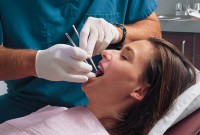
In the past, oral cancer was usually tied to use of tobacco, alcohol or both. But a sharp spike in oral cancer insurance claims among American men seemingly points to a surprising new cause.
A Dramatic Shift in Oral Cancer Numbers
FAIR Heath is a national non-profit corporation that serves as a resource for information regarding healthcare costs and health insurance claims. A recent FAIR Health report, compiled from a database including more than 21 billion privately billed claims, showed a 61 percent increase in oral cancer claims between 2011 and 2015.
The largest increases were seen in cases of throat cancer and tongue cancer. Breaking the claims down further by gender; a startling three-quarters were filed by men.
Searching for Answers
While oral cancer rates have remained relatively steady, smoking rates have fallen over the years, so what’s behind these numbers? Healthcare professionals suspect a link to human papillomavirus, or HPV, which is the most common sexually transmitted infection according to CDC.
HPV infects the skin and membranes that line areas such as the mouth, throat and sexual organs. The virus has already been determined to be a cause of cervical, vaginal and penile cancers, and now experts are turning their attention toward HPV as a possible factor in some of the 50,000 cases of oral cancer that will be diagnosed this year.
Immunotherapy for Cancer: Boosting Your Body’s Natural Defenses
Issels® has long been a leader in state-of-the-art immunotherapy for cancer treatments. Contact us to learn more about our non-toxic, personally tailored programs that strengthen and support your body’s own immune response.


